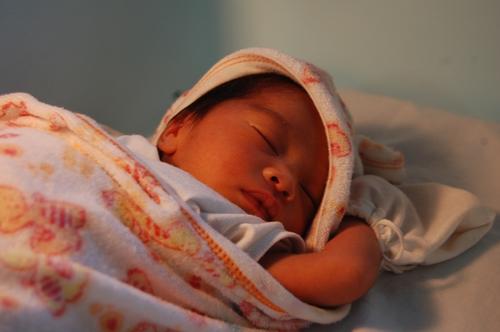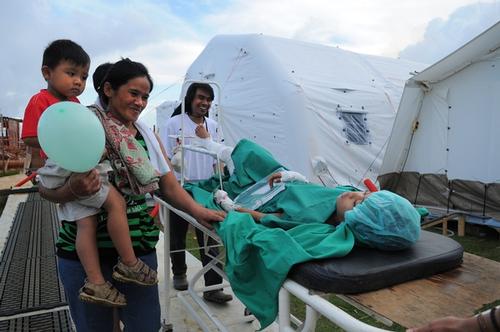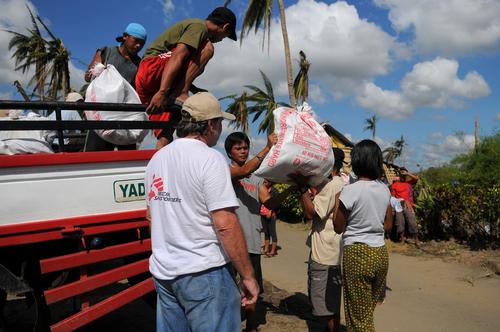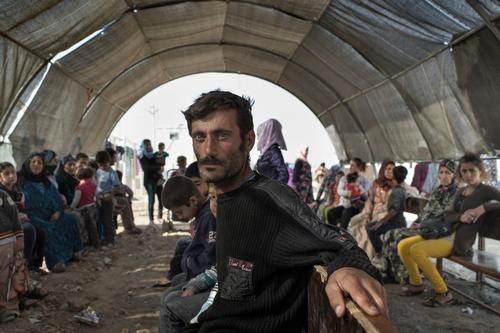Angel Corate gave birth to baby Janel on 16 December by caesarean section. She underwent this lifesaving operation, and she and Janel received ongoing care, at the maternity ward and newborn unit in the Médecins Sans Frontières (MSF) inflatable hospital in Tacloban, Philippines. Nine days later, Angel and Janel were discharged on Christmas Day, in time to celebrate with their family.
Janel Corate was born one month prematurely on Monday 16 December. Her mum, Angel, 31, had been rushed to MSF’s inflatable hospital in Tacloban from another MSF health facility in nearby Tanauan. MSF’s Tanauan hospital has no operating theatre, so could not perform the lifesaving caesarean that Angel needed after she was diagnosed with placenta praevia, a condition that puts mother and child at risk. A mother with placenta praevia can bleed to death during a natural birth. “This really was a lifesaving intervention for mother and baby,” said Dr Natalie Roberts, MSF’s project coordinator in Tacloban.
From birth, Janel had a good chance of surviving, but she weighed just 1.9 kg and was not feeding well. She also developed jaundice. MSF’s medical team gave her phototherapy and support with feeding, and nine days later she and Angel were allowed to go home to join her two sisters, brother and father for Christmas.
“I feel so excited about taking her home for Christmas. I’m so excited to celebrate Christmas with my daughter,” said Angel, just before she and Janel were discharged. “I felt so worried about her when she was born.”
Typhoon Haiyan survivor
Angel is a survivor of Typhoon Haiyan, known locally as Typhoon Yolanda. “Maybe one day I will tell her what happened,” said Angel.
During the typhoon, Angel and her family sheltered in a building in the town of Tanauan with 80 other people. When the building flooded, they went upstairs to the second floor. The storm carried on for three hours and eventually the roof blew off.
“I felt afraid then, and I feel afraid now because the storm was so strong. The babies and children were crying, everyone was crying. We were so afraid.”
Tanauan was hit incredibly hard by Typhoon Haiyan. More than 1,000 people are still missing and 1,300 people died. One school in the area will be missing 59 pupils when it reopens in January. Most buildings in the town were severely damaged and, although most roads are now clear, the town is still covered in debris. MSF’s 25-bed tented hospital in Tanauan has an emergency room, a paediatric ward and a maternity unit, and teams are running mobile clinics in the surrounding area.
“It looked like the end of the earth"
When the typhoon diminished, Angel and her family went outside. “It looked like the end of the earth. It was so dark – you couldn’t see anything.”
Food was hard to come by – Angel did not eat for two days. “We had only water – no food, not even rice – everything had washed away.”
They had to cope with horrific conditions. “The smell was terrible because of the bodies. My family slept beside dead bodies for two days because so many people were dead.”
Angel’s home was destroyed by the typhoon, so she and her family are staying at her brother’s house. A tent where the roof should be provides some protection from the rainy season.
Angel and her family are still coming to terms with the death of her niece, 5, in the typhoon. But her new baby gives her hope. “I hope we can recover because we have a new baby,” said Angel, just before she left for home.
MSF’s hospital in Tacloban is housed in inflatable tents and in salvageable rooms of the city’s Bethany hospital, which was badly damaged by the typhoon and is currently closed. It has an emergency room, two operating theatres, inpatient and outpatient departments, a blood bank and maternity and neonatal units; it also offers counselling. It is one of only two referral hospitals for secondary healthcare and surgical cases in Tacloban. Since the typhoon, in this hospital alone MSF has performed more than 6,000 outpatient consultations, managed more than 1,000 emergency cases, performed 250 surgeries and delivered more than 100 babies.
View all MSF coverage of its response to Typhoon Haiyan






